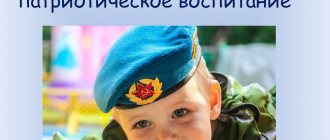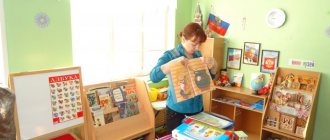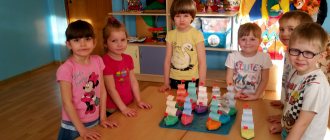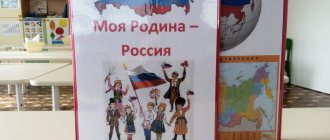Project on patriotic education of preschool children
Relevance
Patriotism is the most important value of fundamental importance. Currently, Russia is going through a difficult historical period. His greatest danger is the destruction of personality. Preschool age is the time when the foundation for raising a child as an individual is laid, when a stable idea of good and evil is determined, the rules of morality and norms of behavior are learned, one’s own will and character are manifested, relationships with parents, friends, and people around him are built, and qualitative originality is revealed. creative individuality of the child.
The education of a new citizen must begin from a very early age. The sooner a feeling of pride for his Fatherland is instilled in the child’s mind, the sooner he joins cultural, historical and national traditions, gets acquainted with the pages of the history of his Motherland, learns about the creation of the Russian state by his ancestors, the more successful his development as a citizen will be in the future. .
The concept of “Motherland” has several meanings: it is a great power with a great history, it is also the corner of the earth where you were born and grew up. From the moment of birth, a person instinctively, naturally and imperceptibly gets used to his environment, the nature and culture of his small homeland, to the way of life of his people. Any region, region, even a small village has its originality and uniqueness. However, it is not enough to love your native land, you need to know its history and culture, have a desire to protect and improve it.
The focus of the Federal State Educational Standard for Educational Education on the inclusion of regional characteristics in the educational environment contributes not only to education, but also to the civic development of the individual and the development of universal human values.
If the integrity of the process of patriotic education is violated, development guidelines will be lost and connections between generations will be disrupted. That is why moral education, the education of a citizen of one’s country, should begin at an age capable of continuing the path of peace, goodness and spiritual perfection for several generations to come. The topic of Russia is very productive for patriotic education. It is better to start with what is close and concrete, with what surrounds the child every day, what is always nearby, what he sometimes does not even notice behind the familiarity and routine.
Thus, the problem of patriotic education based on familiarization with one’s native country is one of the most pressing today. In this regard, we can conclude that work on patriotic education should begin in preschool age, this work should be carried out in a certain system, taking into account cultural and historical traditions, maintaining close contact with the families of pupils, using various forms of work.
Project “Formation of patriotic feelings among older preschoolers”
Target:
Continue to introduce children to folk traditions and customs. Expand ideas about the art, traditions and customs of the peoples of Russia. Expand ideas about the diversity of folk art and crafts (different types of materials, different regions of our country). Cultivate interest in the art of your native land; love and respect for works of art.
Continue to introduce children to oral folk art. Use folklore when organizing all types of children's activities.
"Our Cosmonauts"
Target:
Introduce children to the history of the development of astronautics, to the first cosmonauts.
Form an initial idea of the structure of the solar system, the planets (their sizes, location to the Sun, some features).
"Victory Day"
Target:
Raise children in the spirit of patriotism and love for the Motherland. Expand knowledge about the heroes of the Great Patriotic War, about the victory of our country in the war.
Introduce monuments to WWII heroes.
Tell children about the military awards of their grandparents and parents.
Talk about the continuity of generations of defenders of the Motherland: from epic heroes to heroes of the Second World War.
Develop a respectful, caring attitude towards elderly relatives.
The project is carried out through the following forms
work with children: direct educational activities, entertainment, holidays, conversations, reading fiction and familiarization with oral folk art, artistic creativity, role-playing, folk, verbal, didactic games, listening to musical works.
Working with teachers
for patriotic education of children is organized in the following forms:
•Consultations on “Patriotic education of preschool children.” “The role of the family in the moral and patriotic education of preschool children.” “Russian cultural traditions and moral and patriotic education of preschoolers.” “Creating conditions in kindergarten for the patriotic education of children.”
•Show-competition of corners on patriotic education of children.
•Implementation of pedagogical projects “Folk rag doll”. “Matryoshka is the soul of Russia”, “Museum in a preschool educational institution”, “The city in which I live”, “My native land”, “Secrets of space”.
•Master class for teachers “Rag Doll”.
•Pedagogical Council “Moral and Patriotic Education of Preschool Children.”
Thematic planning for working with parents
.
forms are used to work with parents:
works: consultations: “Moral and patriotic education of preschool children”, “Education of citizenship and patriotism in preschool children through music”, “Russian folklore in educating preschoolers about the culture of family traditions”, “Education of children through familiarization with folk culture”; parent meeting “Raising Patriots”; master classes: “Folk traditions in the life of your family”, “Folk and applied creativity. Types of patterns of Russian folk art crafts in drawing"; survey; production of booklets: “Rites and customs of Russian folk culture. Naming”, “Play folk outdoor games with children”, “Holding the Defender of the Fatherland Day holiday at home”. As well as such forms of work as round tables, conversations, joint exhibitions of drawings and photographs with children, and involving parents in participating in entertainment and celebrations.
CHILDHOOD GUIDE
From work experience
“Civic-patriotic education of preschool children”
Zubekhina Anna Evgenievna,
Kryukova Tamara Alexandrovna,
teachers of MBOU secondary school No. 165, preschool department,
Novosibirsk city
“Just like a small tree that barely rises above the ground, a caring gardener strengthens the root, on the power of which the life of the plant depends for several decades, so a teacher should take care of instilling in his children a feeling of boundless love for the Motherland.”
Vasily Alexandrovich Sukhomlinsky
The problem of patriotic education of the younger generation is one of the most pressing . Patriotic education of preschoolers is not only the education of love for one’s home, family, kindergarten, city, native nature, the cultural heritage of one’s people, one’s nation, and a tolerant attitude towards representatives of other nationalities, but also the education of a respectful attitude towards the worker and the results of his work, native land, defenders of the Fatherland, state symbols, state traditions and national holidays.
In the Russian education system, a special culture of support and assistance to the child, family, and teachers in the educational process is developing - psychological and pedagogical support. The concept of modernization of Russian education defines priority tasks, the solution of which requires the construction of an adequate system of psychological and pedagogical support. One of these tasks is the patriotic education of the younger generation.
The federal educational standard for preschool education sets goals for patriotic education : creating conditions for the formation of the foundations of patriotic consciousness of children, the possibility of positive socialization of the child, his comprehensive personal, moral and cognitive development, development of initiative and creativity based on types of activities appropriate for preschool age.
The content of the Federal State Educational Standard notes the urgent need to intensify the process of instilling patriotism in preschoolers. Children at this age are very inquisitive, responsive, and receptive. They easily respond to all initiatives and are able to sincerely sympathize and empathize. For the educator, this is a time of fertile soil. Indeed, at this age great opportunities arise for the systematic and consistent moral education of children. The formation of the child’s spiritual foundation, emotions, feelings, thinking, processes of social adaptation in society takes place, and the process of realizing oneself in the world around us begins. It is this period of a person’s life that is most favorable for the emotional and psychological impact on a child, since his images are very bright and strong, and therefore they remain in memory for a long time, and sometimes for a lifetime, which is very important in the education of patriotism.
Patriotic education of a child is the basis for the formation of a future citizen. Patriotism is love for the Motherland, devotion to one’s Fatherland, the desire to serve its interests and readiness, even to the point of self-sacrifice, to defend it.
are known : love for the Motherland begins with an attitude towards the closest people - father, mother, grandfather, grandmother, with love for one's home, the street on which the child lives, kindergarten, school, city.
The main tasks of patriotic education of preschool children:
- formation of love for the native land (involvement in one’s home, family, kindergarten, city);
— formation of spiritual and moral relations;
— formation of love for the cultural heritage of one’s people;
- nurturing a love of respect for one’s national characteristics;
— self-esteem as a representative of one’s people;
- a tolerant attitude towards representatives of other nationalities, peers, parents, neighbors, and other people.
System of work on patriotic education of children:
- Familiarization with the objects of the immediate environment: - fostering respect for working people and objects of folk art, artistic crafts;
— fostering respect for working people and the objects they produce;
— acquaintance with people who glorified Russia;
- fostering a sense of friendship towards people of other nationalities.
- Familiarization with the phenomena of public life: - nurturing a sense of belonging to the life of the country (patriotic dates and holidays);
- a thrifty attitude towards what is made by people; - nurturing love for the native land, for the Motherland (idea of the country, cities, capital, symbols of the state;
— acquaintance with the sights of the city, architectural monuments, and the names of streets bearing the names of famous people;
— acquaintance with the events taking place in the country, expanding ideas about the country, the capital, and the symbols of the state.
- Familiarization with nature: - nurturing love for the nature of the native land; - fostering a caring attitude towards native nature; — fostering a sense of the need for labor participation in the protection of native nature.
Forms of work on patriotic education:
— creation of a developing environment for civic and patriotic education;
— thematic classes;
— project activities;
- conversations about the Motherland, about the hometown, about the nature of the native land, about good people, reading children's books on patriotic themes, an appropriate selection of songs and poems for learning, watching movies, television programs for children, purposeful games;
— interaction with parents;
- interaction with society.
Work on patriotic education in our preschool:
.
Education of moral and patriotic feelings in preschool children through familiarization with their native nature Musical and patriotic education of preschool children Patriotic education of children of senior preschool age through the project method Spiritual and moral education of preschool children >





